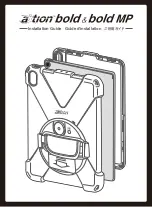
1
2 3
10
11
12
12
12
12
Exploring the Tablet PC
How to start
Package List
Documentation
1
3
2
1
Tablet PC
2
Quick Start Guide
3
Power Adapter
Using the Touchscreen
Using the Touchscreen
13
4
5
Fan (do not block)
Exploring the Tablet PC
Charging the Tablet PC
Taking Care of your Tablet PC
Quick Start Guide
8
USB 2.0 ports
7
1
Touch hotkey
¹
2
Status indicator
3
Light sensor
²
4
Microphone
5
Webcam
6
DC input
Audio input and output
for OMTP headset
9
10
SD card reader
11
SIM card reader
Stereo speakers
Power button
13
Mini-HDMI
12
Blue
Status Indicator
On
Off
LED Color
Wi-Fi/BT/3G/GPS
Enabled
Wi-Fi/BT/3G/GPS
Disabled
Power Button LED
LED Color
Powered On Powered Off Sleep Mode
Blue
On
Blinking
Off
¹The touch hotkey performs the following functions:
In DOS:
- In the case of an abnormal shut down and subsequent DOS startup
the touch hotkey performs the following keyboard-based functions:
- Short press = “Down arrow” key
- Long press = “Enter” key
In Windows:
- Opens/Minimizes the Launcher
²The Light Sensor performs the following functions:
-Automatically adjusts the brightness of the screen based on ambient light.
-Allows the user to adjust the baseline light level.
9
8
7
6
Starting up the Tablet PC
Administrator
*Note: Windows login requires user setup and will vary by region.
4
4
Support Disc (depending on SKU)
Gesture
Windows
Usage
Action
Diagram
Tapping
Click
Lightly tapping on an object
in the screen performs the
same function as a mouse
click. A double tap is the
same as a double click.
Flicking
Default:
Pan Up/
Down/
Left/Right
Flicking the screen in
either an up, down, left, or
right allows you to quickly
navigate or scroll through
various screens.
Dragging
Mouse
Drag
Holding your
fi
nger on an
item on the screen while
moving your
finger
around
allows you to drag items to
different locations on the
screen. The same motion
also allows you to slowly
scroll through screens.
Pinching
Zoom
Out
Touching the screen with
two fingers apart and
pinching together allows
for you to zoom out.
Expanding
Zoom In Touching the screen with
two
fi
ngers close together
and spreading them out
allows for you to zoom in.
Gesture
Windows
Usage
Action
Diagram
Rotating
Rotation Touching two points on
an image and moving
your fingers in a twisting
motion allows you to rotate
images.
Press and
Tap
Right-
Click
Pressing the screen with
one
finger
and then tapping
with a second
finge
r nearby
brings up the right-click
menu.
Press and
Hold
Right-
Click
Pressing, holding, and
releasing on the screen
with a
finger
brings up the
right-click menu.
Handling the Tablet PC
Failure to follow the handling information could result in damage to the device.
Using Connectors and Ports
Never force a connector into a port. Check for any obstructions on the port.
Ensure that the connector matches the port and that you have positioned the
connector correctly in relation to the port.
Keeping the Tablet PC Clean
Use a soft, lint-free cloth to clean the touchscreen. Avoid getting moisture in
openings. Do not use aerosol, sprays, solvents, alcohol or abrasives to clean
the device.
Glass Parts
The glass touchscreen could break if the device is dropped on a hard surface or
suffers a substantial impact. Glass cracked due to abuse or misuse is not covered
under war
r
anty.
Taking Care of your Tablet PC
Transporting the Tablet PC
This device contains sensitive components including a large glass touchscreen.
Do not drop, knock or crush the device.
Battery
The battery is non-replaceable.
Disassembly
Attention: Do not remove any stickers on the device with the mark,
doing so will void the device’s warranty.
FCC Notice
Notice (Information to user):
You are cautioned that changes or modifications not expressly approved by the party responsible for
compliance could void your authority to operate the equipment.
Notice
This device complies with Part 15 of the FCC Rules. Operation is subject to the following two
conditions: (1) this device may not cause harmful interference and (2) this device must accept any
interference received, including interference that may cause undesired operation.
For P15B equipment
This equipment has been tested and found to comply with the limits for a Class B digital device,
pursuant to part 15 of the FCC rules. These limits are designed to provide reasonable protection
against harmful interference in a residential installation. This equipment generates, uses and can
radiate radio frequency energy and, if not installed and used in accordance with the instructions, may
cause harmful interference to radio communications. However, there is no guarantee that interfer-
ence will not occur in a particular installation. If this equipment does cause harmful interference to
radio or television reception, which can be determined by turning the equipment off and on, the user
is encouraged to try to correct the interference by one or more of the following measures:
-Reorient or relocate the receiving antenna.
-Increase the separation between the equipment and receiver.
-Connect the equipment into an outlet on a circuit different from that to which the receiver is
connected.
-Consult the dealer or an experienced radio/TV technician for help.
For portable devices
FCC RF Radiation Exposure Statement
:
1. This Transmitter must not be co-located or operating in conjunction with any other antenna or
transmitter.
2. This equipment complies with FCC RF radiation exposure limits set forth for an uncontrolled
environment. This device was tested for typical hand held operations with the device contacted
directly to the human body to the sides of the device. To maintain compliance with FCC RF exposure
compliance requirements, avoid direct contact to the transmitting antenna during transmitting.
1
506-0FK2000
SOLUTIONS FOR A
SMARTER
WORLD


















